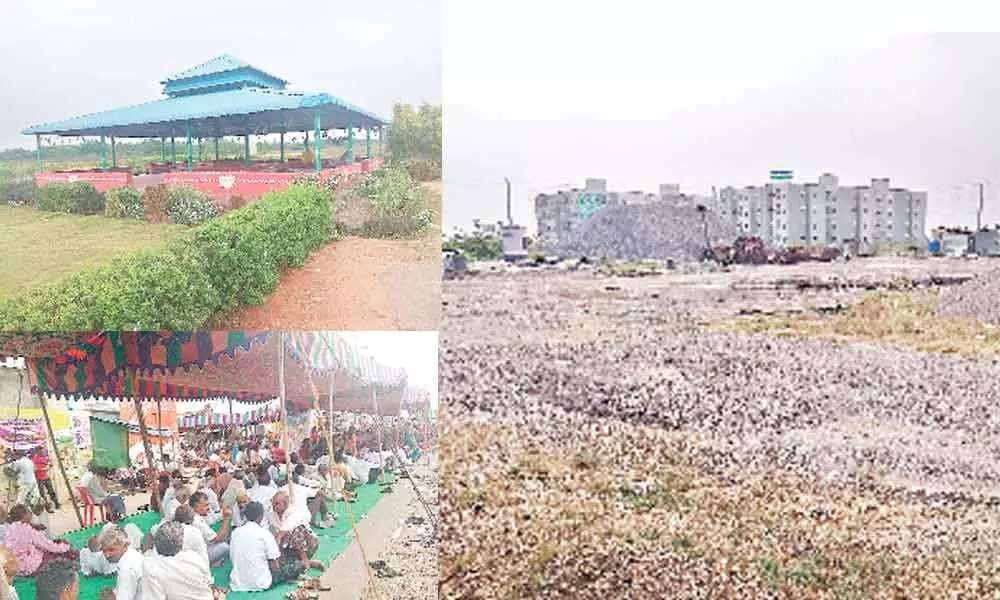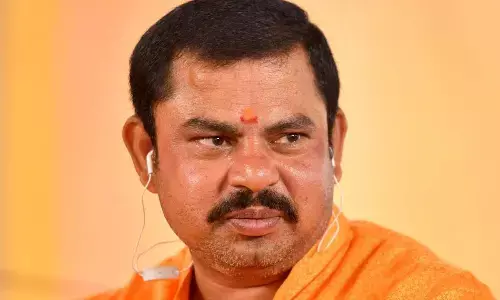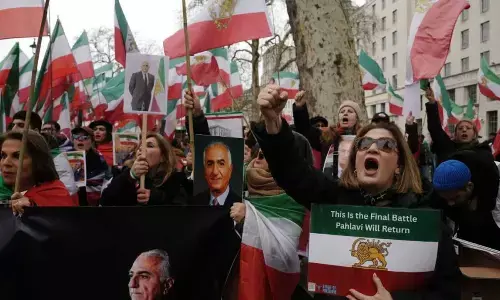Untangling Amaravati knot complex process

Land issue will test YS Jagan-led YSRCP govt's patience; It will be as challenging as developing the capital
Yeduguri Sandinti Jagan Mohan Reddy, who stormed to power with a massive majority in the last year's Assembly elections and took reins of Andhra Pradesh as its Chief Minister in last May at an age of 46 years, has cultivated an image that he is a man, who sticks to his words and promises.
Many including his ardent followers say he lost 2014 Assembly elections to TDP and its leader Nara Chandrababu Naidu by a whisker because of his 'keeping-the-promise-at-any-cost' habit. While Naidu promised to waive off all agriculture loans, YS Jagan refused to do so despite pressure from his party leaders.
The young leader's contention then was that it would be next to impossible to implement the loan waiver given the precarious financial position Andhra Pradesh was in. The promise made a big difference in the elections and TDP won.
But Jagan's assessment came true as the TDP government failed to implement the loan waiver in toto. This failure also played a role in the humiliating defeat of TDP in 2019 Assembly elections. However, that's a different story.
But the impact of Jagan's image as a man, who never goes back on his decisions is amply visible if one now visits any of the 29 villages that form the core part of Amaravati, the Greenfield capital for Andhra Pradesh planned by the TDP's Naidu on the south banks of Krishna River near Vijayawada.
With Andhra Pradesh losing cash cow in Hyderabad to Telangana in the bifurcation, Naidu wanted similar urban conglomeration in truncated AP and envisaged Amaravati as a world-class city.
Floored by his grandiose plans, over 25,000 farmers from the 29 villages contributed a whopping 34,381 acres of land to the proposed capital under land pooling scheme (LPS) announced by the Naidu government on January 1, 2015.
The previous government planned nine different cities including a government city in Amaravati and offered farmers 30 per cent of the land in the form of developed plots – both residential and commercial.
The government also agreed to pay some yearly compensation to them for 10 years. The idea behind the LPS is that once the capital is developed, the land value will go up by multiple times and as result, farmers will reap rich dividends if they monetize their plots.
But all these mega city plans disappeared into thin air after CM Jagan announced last month that his government would go for three capitals, not one, and would develop executive capital in Visakhapatnam.
For all practical purposes, this coastal city will be the main capital for AP as Secretariat and CM's office will be located there.
This announcement came as a rude rock for farmers who gave their lands for Amaravati. They have been staging sit-in protests and undertaking other forms of agitations against the AP government's move to shift administrative machinery to Visakhapatnam.
But most of them know very well that they are fighting for a lost cause and the main capital will eventually be moved to Visakhapatnam.
"We know for sure that CM Jagan will not go back once he makes a decision. But we are now left in lurch for no fault of ours as we never asked for the capital to be located here," they point out.
This is a clear indication that the ongoing agitation in Amaravati against AP government's plan for three capitals will fizzle out sooner than later. But that's when the real problem will start.
Thanks to complex land pooling scheme, settling the Amaravati issue is not as simple as the proposed shifting of the administration to Visakhapatnam and AP High Court to Kurnool.
For instance, Karumanchu Suribabu, a farmer in Velgapudi, had 13 acres of land, in which he used to cultivate banana, sugarcane and other crops. He surrendered his land to the AP government under the LPS.
In return, he received open plots measuring around 15,000 square yards - a mix of residential and commercial plots. He got plots which were carved out of others' land while others got their returnable plots allotted in his land.
Registration formalities of all these plots have already been completed. This clearly indicates how complicated the land issue is in Amaravati.
Besides access road to seed capital is close to completion and over 30 internal roads have been laid. Some buildings were constructed and many more are under various stages of construction.
Canals and small streams that collect rainwater disappeared as land has been levelled to make it suitable for construction.
The big question now is how the YS Jagan government will resolve this tricky land issue. Frankly, it will not have many options at its disposal.
One option could be to give back the entire acquired land to farmers. For that to happen, it needs to dismantle all the buildings, roads and other infrastructure constructed in Amaravati area and bring the lands back into cultivable condition.
This is obviously a strenuous process and needs significant amount of funds. But it is the best possible solution from the point of farmers as they get back their lands in similar condition that they handed over to the government in 2015.
Also, there will be curtains on Amaravati capital project forever if the YS Jagan govt opts for this option.
But the destruction of constructed infrastructure may not go down well with people. Besides, such a move will draw flak from Opposition parties.
The second option could be utilising some of infrastructure created thus far, for educational institutions and as office complexes too - government or private.
The government should build access roads and other infrastructure for such facilities while removing the infrastructure including roads which will not be useful.
All the unutilised land could be distributed to original owners. However, the government should change the land use and make lands suitable for cultivation. Also, it should adequately compensate the farmers who will lose their lands.
Thirdly, it can develop the entire area into educational or green industrial hubs. But given the land prices in the area, this is an expensive process.
It's also a time-consuming move. Furthermore, companies or educational institutions may not be willing to pay high prices for land.
In addition, with uncertainty over capital and other developments, it is not going to be easy for Andhra Pradesh to attract investments in near future.
So, it is better if the AP government opts for second option of retaining usable infrastructure, destroying the rest and returning the land that will not be useful for the government.
Anyway, untangling Amaravati land knot is going to be a complex process and it will test the patience of YS Jagan government for a long time to come.
The issue will be as challenging as developing the capital. It is to be seen how AP government will handle this complicated issue.
Last word: The bottom line is simple and crystal clear. Every individual on the earth wants to own and drive a Ferrari and live in an Italian villa and enjoy seven-star holidays.
Also, every parent wants his or her children to go to best schools in BMWs, Audis and Mercedes Benz, and enjoy the best comforts the world can offer. Some people ingrained with Leftist and idealistic ideologies may be an exception to this rule.
But their number is few and far between. But the fact of the matter is that it is not possible for 99 per cent of people living in the world to lead a luxurious life. That's a preserve of a select few who are successful, capable of generating wealth and spending it wisely.
If someone ventures to provide luxurious comforts to his or her children without developing adequate streams of income sources, his or her life will become miserable and turn into a non-performing asset (NPA), the economic equivalent of hell.
This applies to common people, businessmen, industrialists as well as rulers. Playing with economics is not a safe idea.










